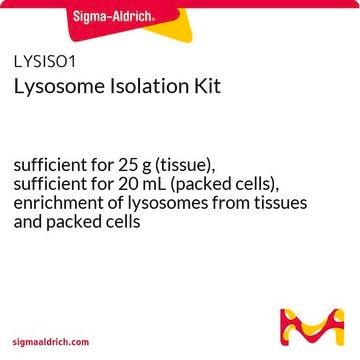GL0010
Golgi Isolation Kit
sufficient for 50 g (tissue)
Synonym(e):
Golgi Kit, Isolation Kit for Golgi
Anmeldenzur Ansicht organisationsspezifischer und vertraglich vereinbarter Preise
Alle Fotos(1)
About This Item
UNSPSC-Code:
12352200
NACRES:
NA.32
Empfohlene Produkte
Verwendung
sufficient for 50 g (tissue)
Qualitätsniveau
Methode(n)
fractionation: suitable
Versandbedingung
wet ice
Lagertemp.
2-8°C
Allgemeine Beschreibung
The Golgi Isolation Kit provides a method for isolating Golgi membranes from mammalian soft tissues by discontinuous density gradient. The degree of Golgi enrichment can be determined by assaying the acitivty of UDP-galactosyl transferase or by immunodetection of Golgi specific marker proteins like B-COP or GM130 using appropriate antibodies (Cat. No. G6160 and G7295, respectively). Separation from other organelles can be measured using the appropriate marker detection kits (Cat. No. CS0780, CYTOCOX1, CY0100 and CAT100).
Anwendung
Golgi Isolation Kit may be used for the isolation of Golgi membranes from mammalian soft tissues by discontinuous density gradient.
Hinweis zur Analyse
The Golgi Isolation kit was optimized using rat liver and tested on rat kidney, spleen, and heart.
Kit-Komponenten auch einzeln erhältlich
Produkt-Nr.
Beschreibung
SDB
- P8340Protease Inhibitor Cocktail, for use with mammalian cell and tissue extracts, DMSO solution 5 mLSDB
Lagerklassenschlüssel
10 - Combustible liquids
WGK
WGK 3
Analysenzertifikate (COA)
Suchen Sie nach Analysenzertifikate (COA), indem Sie die Lot-/Chargennummer des Produkts eingeben. Lot- und Chargennummern sind auf dem Produktetikett hinter den Wörtern ‘Lot’ oder ‘Batch’ (Lot oder Charge) zu finden.
Besitzen Sie dieses Produkt bereits?
In der Dokumentenbibliothek finden Sie die Dokumentation zu den Produkten, die Sie kürzlich erworben haben.
Kunden haben sich ebenfalls angesehen
E R Sjoberg et al.
The Journal of biological chemistry, 268(14), 10185-10196 (1993-05-15)
The melanoma-associated disialogangliosides 9(7)-O-acetyl-GD3 and 9(7)-O-acetyl-GD2 have been structurally well characterized. However, the compartmentalization and sequence of action of the biosynthetic activities responsible for synthesizing these molecules remain obscure. Here, we have studied the spatial and temporal interrelationships among the
V J Allan et al.
The Journal of cell biology, 113(2), 347-359 (1991-04-01)
When higher eukaryotic cells enter mitosis, membrane organization changes dramatically and traffic between membrane compartments is inhibited. Since membrane transport along microtubules is involved in secretion, endocytosis, and the positioning of organelles during interphase, we have explored whether the mitotic
Julien Villeneuve et al.
The Journal of cell biology, 217(2), 649-665 (2017-12-08)
An appreciation of the functional properties of the cytoplasmic fatty acid binding protein 4 (FABP4) has advanced with the recent demonstration that an extracellular form secreted by adipocytes regulates a wide range of physiological functions. Little, however, is known about
A Surroca et al.
The Journal of membrane biology, 177(3), 243-249 (2000-10-03)
We investigated the direct effect of inositol 1,4,5-trisphosphate (IP(3)) and ryanodine receptor agonists on Ca(2+) release from vesicles of a rat liver Golgi apparatus (GA) enriched fraction, which were actively loaded with (45)Ca(2+). Results in GA were compared with those
E Prchla et al.
The Journal of cell biology, 131(1), 111-123 (1995-10-01)
Endosomal penetration by nonenveloped viruses might be accomplished by either local breakdown of the endosomal membrane (e.g., adenovirus) or formation of a membrane-spanning pore by capsid proteins. Uncoating of the nonenveloped virus human rhinovirus serotype 2 (HRV2) has been shown
Unser Team von Wissenschaftlern verfügt über Erfahrung in allen Forschungsbereichen einschließlich Life Science, Materialwissenschaften, chemischer Synthese, Chromatographie, Analytik und vielen mehr..
Setzen Sie sich mit dem technischen Dienst in Verbindung.










